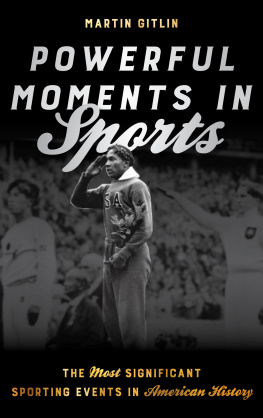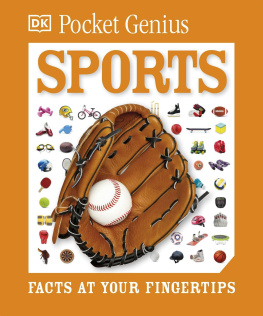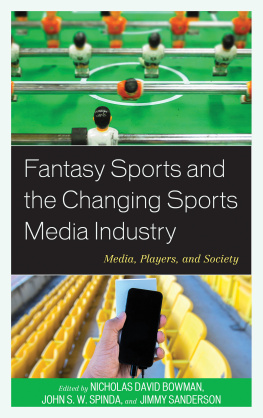IMMORTALITY IN SPORTS
IMMORTALITY IN SPORTS
A SOCIOLOGY OF MEDIA, FAME, AND INFAMY
WIB LEONARD
First published 2012 by Paradigm Publishers
Published 2016 by Routledge
2 Park Square,Milton Park, Abingdon, Oxon OX14 4RN
711 Third Avenue, New York, NY 10017, USA
Routledge is an imprint of the Taylor & Francis Group, an informa business
Copyright 2012, Taylor & Francis.
All rights reserved. No part of this book may be reprinted or reproduced or utilised in any form or by any electronic, mechanical, or other means, now known or hereafter invented, including photocopying and recording, or in any information storage or retrieval system, without permission in writing from the publishers.
Notice:
Product or corporate names may be trademarks or registered trademarks, and are used only for identification and explanation without intent to infringe.
Library of Congress Cataloging-in-Publication Data
Leonard, Wib.
Immortality in sports : a sociology of media, fame, and infamy / Wib Leonard.
p. cm.
Includes bibliographical references and index.
ISBN 978-1-59451-960-4 (hardcover : alk. paper)
1. SportsSociological aspects. 2. Identity (Psychology)
I. Title.
GV706.5.L463 2012
306.4'83dc23
2012005936
Designed and Typeset by Straight Creek Bookmakers.
ISBN 13 : 978-1-59451-960-4 (hbk)
ISBN 13 : 978-1-59451-961-1 (pbk)
Contents
The sociology of sport, one of the newest subfields to emerge within the social sciences, applies sociological theories, principles, and concepts to shed a fresh perspective on the nature of sports in society. This book uses two related yet distinct sociological ideassymbolic immortality and the postselfto demonstrate how and the ways in which sports can be viewed from this viewpoint.
Because these two concepts provide integrating threads, it is imperative that they be explicitly understood at the outset. By symbolic immortality, I am referring to the way sin which one can live in perpetuity other than in a physical/biological/material sense. When athletes are inducted into a sports hall of fame, their jersey numbers are retired, or their likenesses are bronzed, they live on indefinitely in the symbolic sense.
The postself refers to how one wants to think of himself or how one would like others to think of him when his playing days are over. Ted Williams aptly conveyed this idea when he said, All I want out of life is that when I walk down the street folks will say, There goes the greatest hitter who ever lived.1 Even the obviousness and permanence of sports body arttattoosamong athletes is an unobtrusive signal their personal-social postself.
Because sports are one of the most popular and visible aspects of society, they can neither be insulated from nor isolated from broader social currents. To wit, sports are a microcosm of the larger society and provide mirrors to the nature and characteristics of self and of society.
The processes and dynamics through which individuals seek to leave their mark through achievements in sports are explored. Various media forms indicate that athletes and their significant others frequently become concerned about how they will be evaluated by future audiences. The characteristics of the social world of sport that foster and facilitate concerns about symbolic immortality and the postself and the reactions of individuals to these factors are discussed. The included photographs operate as a series of emotional reminders in the reliving or re-experiencing of a sports phenomenon.
This book is based upon my Presidential Address to the North American Society for the Sociology of Sport, which was delivered in Montreal, Canada. It was originally titled Symbolic Immortality and the Postself in the Social World of Sport.
Thanks to my friend and colleague Ray Schmitt for his insights and contributions to this manuscript.
Wib Leonard, 2012
Note
1. http://en.wikiquote.org/wiki/Ted_Williams.
Sports have taken on tremendous importance in the world in which we live. Their social significanceeconomic, political, and personalboth nationally and internationally is unprecedented. They have become high-profile global social items. What may not be so obvious on first blush is the sociological nature of sports. When most of us think about sports, their physical dimensions readily come to mind. Attributes such as speed, agility, quickness, and strength are immediately associated with them. And that is true; but their very essence, as we will see, is social in nature.
The purpose of this introduction is to establish a common baseline for understanding what is to follow and to demonstrate the interconnections among the discipline of sociology, the world of sports, and two integrating conceptssymbolic immortality and the postselfthat permeate this work. These notions, as you will see, are intricately entwined. I will begin by making explicit sociology, sports, and their interconnections into the sociology of sport. Then I will introduce the two theoretical concepts that emerge from sociology and that provide the bedrock and focal points for the discussion in this book.
CHAPTER 1
Sport in the Social and Behavioral Sciences
Many disciplinessociology, history, psychology, economics, anthropology, and kinesiology, among othershave contributed to our fund of knowledge about sport in society. Not surprisingly, many of them center on different aspects of the phenomenon of sport. These diverse perspectives often stem from different interests, goals, values, and/or occupations and act as prisms for our perceptions and interpretations of situations and events.
Consider a college football game. A business person courting a client may consider the contest an auspicious setting for carrying on business transactions and sealing a deal. Law-enforcement personnel may focus upon the potential disruption of law and order, what are sometimes called celebratory riots, and the necessity of restoring calm if mayhem breaks out. An economist might see the game as a tradeoff between expenses and revenues or a financial transfusion for the fiscal well-being of the school and community. Finally, a sociologist might be predisposed to notice the different groups representede.g., fraternities/sororities, couples, families, visiting/home-team fansas well as the different roles that are played both on and off the field. It is important to be cognizant that perspectives should not be construed as good or bad, better or worse, or right or wrong, but merely as different. Many vantage points or orientations contribute to understanding human social behavior, and sports behaviors are no different.
The importance of different perspectives is nicely illustrated in an apocryphal story about an Indian czar who wanted to know what an elephant was like. Several blind men were escorted to an elephants stable and asked, after spending several minutes with the elephant, to describe to the czar what a pachyderm was like. Each blind man situated himself by the elephant and had to rely on kinesthetic cues because of his lack of sight. When asked by the czar what an elephant was like, one said the elephant is like a pillar (he touched the leg). A second one said it is like a rope (he touched the tail). A third said it is like a thick branch of a tree (he touched the trunk). A fourth, fifth, and sixth, respectively, said it is like a big hand fan (he touched the ear), a huge wall (he touched the belly), and a solid pipe (he touched the tusk). The moral of the story is that while each man was correct, he was only partially right. Perspectives are like these accounts in that they bring to the forefront certain features while neglecting others. Of course, any phenomenon is holistic in nature, and a more complete comprehension requires multiplicities of viewpoints.











